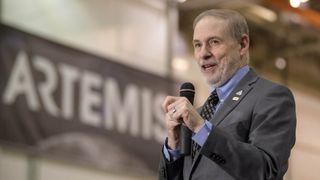NASA human spaceflight chief Doug Loverro resigns on eve of historic SpaceX launch
NASA human spaceflight chief Doug Loverro resigns on eve of historic SpaceX launch

Doug Loverro, NASA's chief of human spaceflight, resigned from his post Monday (May 18) after less than a year on the job, the agency announced today (May 19).
Loverro's resignation as Associate Administrator for NASA's Human Exploration and Operations (HEO) Mission Directorate is a stunning development, as the agency counts down to the first orbital crew launch from U.S. soil in nearly a decade, which will take place on May 27.
Loverro's former deputy, former NASA astronaut Ken Bowersox, has taken over HEO in an acting capacity and will therefore oversee Demo-2, the first crewed mission of SpaceX's Crew Dragon capsule. Demo-2, which will send NASA astronauts Bob Behnken and Doug Hurley to the International Space Station (ISS), is scheduled to lift off atop a SpaceX Falcon 9 rocket from Kennedy Space Center in Florida next week.
No crewed mission has launched to orbit from the United States since NASA retired its space shuttle fleet in 2011. Since then, the space agency has relied completely on Russian Soyuz rockets and spacecraft to get its astronauts to and from the ISS.
The HEO leadership change comes just days ahead of a critical flight readiness review for Demo-2, which Loverro would have overseen. NASA Associate Administrator Steve Jurczyk will oversee that meeting in Loverro's place, agency officials told Space.com.
If all goes well with Demo-2, SpaceX will be clear to start flying operational missions to and from the orbiting lab for NASA. Elon Musk's company holds a $2.6 billion contract with the agency's Commercial Crew Program for six such operational flights.
Though NASA described Loverro's departure as a resignation, Politico reports that there may be more to the story. Two industry sources told the outlet that Loverro was actually pushed out over disagreements with NASA Administrator Jim Bridenstine. Bridenstine made no mention of the shakeup today in remarks to the National Space Council, which is led by Vice President Mike Pence.
Loverro's departure continues a string of recent shakeups at the top of HEO.
The division's longtime leader, Bill Gersteinmaier, was reassigned in July 2019. Bowersox then took over as acting HEO chief until Loverro was announced as the successor in October.
The top HEO job obviously comes with high expectations and a lot of pressure, especially these days. NASA is working to land two astronauts near the moon's south pole in 2024, a tight timeline laid out by the administration of President Donald Trump just last year.
"Loverro hit the ground running this year and has made significant progress in his time at NASA. His leadership of HEO has moved us closer to accomplishing our goal of landing the first woman and the next man on the moon in 2024. Loverro has dedicated more than four decades of his life in service to our country, and we thank him for his service and contributions to the agency," NASA officials wrote today in an emailed statement about Loverro's departure.
"Next week will mark the beginning of a new era in human spaceflight with the launch of NASA astronauts Bob Behnken and Doug Hurley to the International Space Station," the statement added. "We have full confidence in the work Kathy Lueders and her entire Commercial Crew team have done to bring us here. This test flight will be a historic and momentous occasion that will see the return of human spaceflight to our country, and the incredible dedication by the men and women of NASA is what has made this mission possible."
Comments
Post a Comment